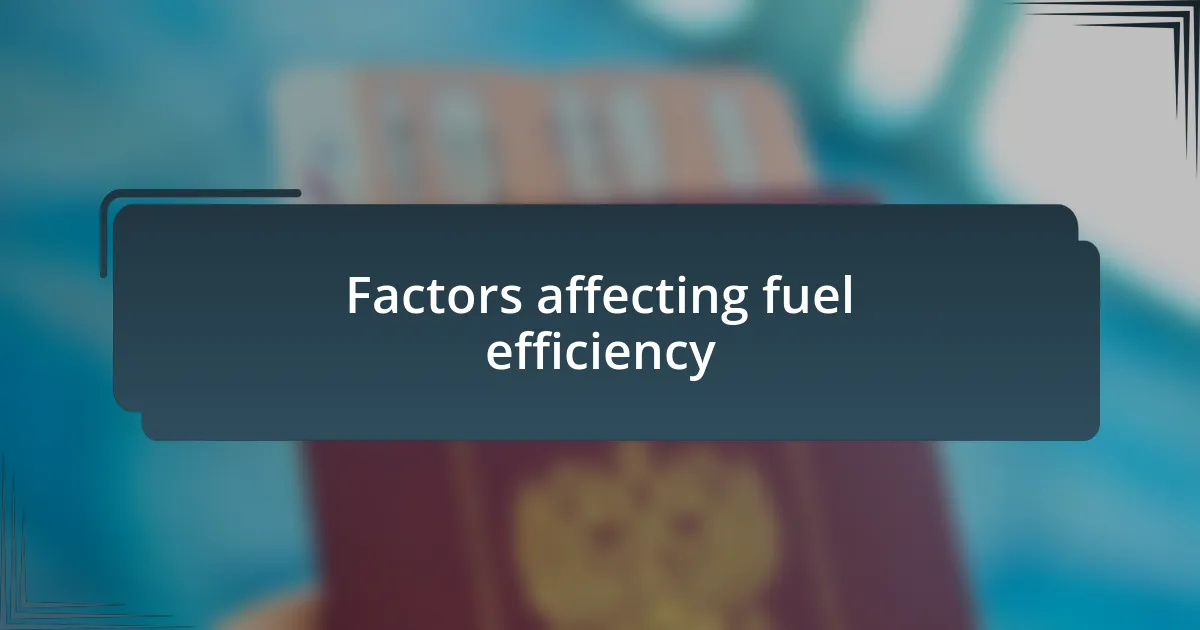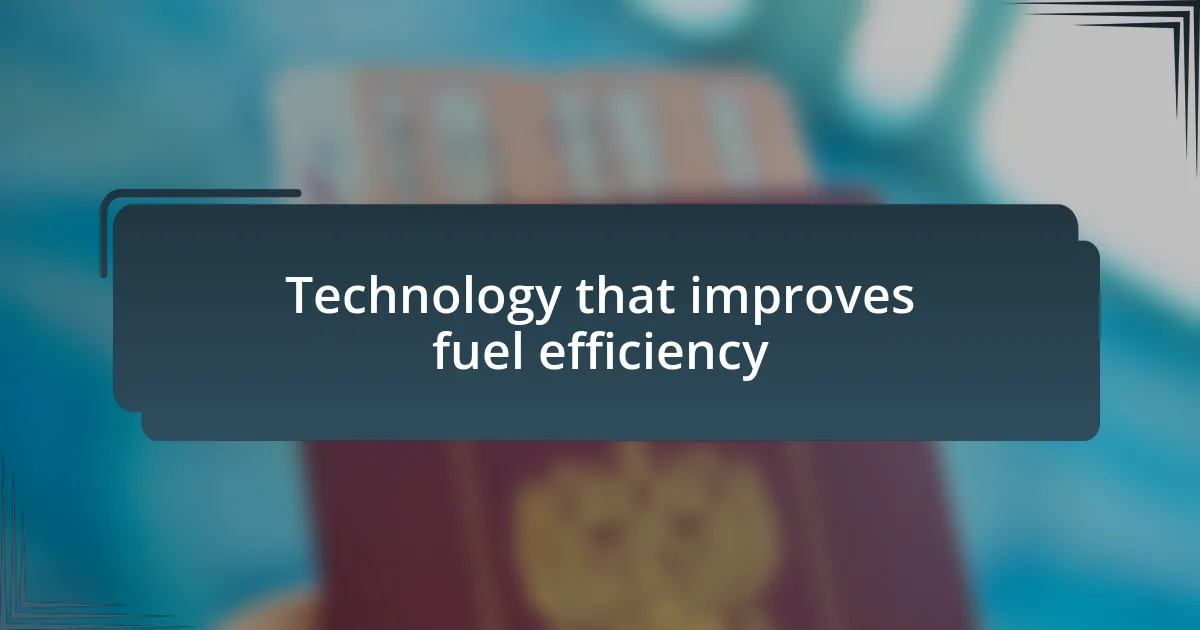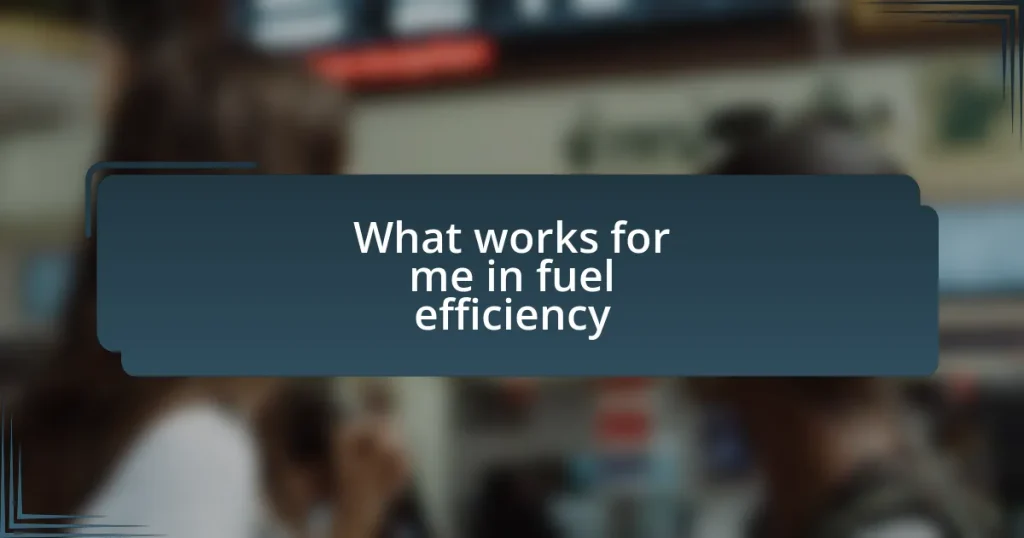Key takeaways:
- Fuel efficiency is influenced by factors such as driving style, vehicle maintenance, load weight, tire pressure, and aerodynamics.
- Adopting effective driving habits, such as maintaining a steady speed and reducing idling, can lead to significant fuel savings.
- Regular maintenance, including tire inflation, oil changes, and air filter replacements, is essential for maximizing fuel efficiency.
- Choosing the right fuel type based on vehicle requirements and considering technology advancements like hybrid systems can improve fuel performance.

Understanding fuel efficiency basics
Fuel efficiency refers to how effectively a vehicle converts fuel into distance traveled, often measured in miles per gallon (MPG). I still remember the moment I first looked at my car’s MPG display; it felt like a small revelation. I was amazed at how a simple number could influence not just my driving habits, but also my wallet and the environment.
Understanding the basics of fuel efficiency also includes knowing that various factors affect it, including driving style, vehicle maintenance, and load. Have you ever considered how much smoother your ride could be with a few tweaks? I found that simply keeping my tires properly inflated made a noticeable difference in my fuel consumption, and it was such an easy change to make.
Moreover, fuel efficiency isn’t just a personal benefit; it has broader implications for reducing carbon emissions. It struck me one day while sitting in traffic, realizing that every efficient decision I make contributes to a cleaner planet. What if we all embraced small changes? Imagine the collective impact we could have!

Factors affecting fuel efficiency
When examining the factors that affect fuel efficiency, it’s astonishing how interconnected they are. For instance, I’ve noticed that my driving habits play a crucial role. There was a time when I sped up aggressively and then slammed on the brakes, thinking it was just part of being on the road. It didn’t take long for me to realize that smooth acceleration and gentle braking not only made my drives more enjoyable but also significantly improved my fuel consumption.
Here are some key factors to consider:
- Driving Style: Aggressive driving can decrease fuel efficiency by up to 30%.
- Vehicle Maintenance: Regular oil changes and air filter replacements keep engines running smoothly.
- Load Weight: Carrying extra weight can reduce MPG; I’ve gone through my trunk to lighten the load.
- Tire Pressure: Keeping tires inflated to the recommended PSI enhances fuel efficiency.
- Aerodynamics: Roof racks and open windows can create drag, reducing efficiency.
Understanding and adjusting these factors has been transformative for me, leading to both financial savings and a more responsible footprint on the environment. It’s fascinating how small changes can yield substantial results.

Effective driving habits for savings
I’ve learned that simple, consistent driving habits can lead to significant savings over time. For example, I’ve made it a point to maintain a steady speed, particularly on the highway. Using cruise control not only helps me stay within speed limits but also optimizes my fuel consumption. Watching my miles per gallon (MPG) improve in real-time has been both satisfying and motivating.
One habit that has really made a difference is anticipating stops. Rather than waiting until I’m almost at a red light to brake, I try to ease off the accelerator early to reduce speed gradually. This approach not only saves fuel but also makes driving less stressful. I often find myself enjoying the ride more, rather than feeling rushed and tense while dodging sudden stops.
In addition to pacing my driving, I’ve also cut down on unnecessary idling. I used to wait in the car for someone, keeping the engine running without thinking much of it. Now, I turn off the engine to save fuel. It’s a small change, but when I reflect on all those minutes waiting, I realize how much fuel I’ll save over time.
| Driving Habit | Estimated Fuel Savings |
|---|---|
| Steady Speed with Cruise Control | Up to 15% |
| Gentle Braking and Acceleration | Up to 30% |
| Turning Off Engine While Idling | Up to 10% |

Regular vehicle maintenance tips
Regular vehicle maintenance is key to maximizing fuel efficiency. I’ve found that keeping my tires properly inflated not only boosts mileage but also enhances overall safety. Each month, I take a few minutes to check tire pressure, and the difference in performance is noticeable. Have you ever noticed how a well-inflated tire rolls so smoothly compared to a flat one?
Additionally, I’ve learned the importance of changing the engine oil regularly. When I first started driving, I often neglected this task, thinking it wasn’t that critical. However, once I started following the recommended oil change intervals, I noticed my engine running more smoothly and my fuel consumption improving. It’s incredible how this simple maintenance step can extend the life of the vehicle and contribute to better gas mileage.
Finally, don’t underestimate the value of replacing air filters. A clean air filter allows the engine to breathe better, leading to improved combustion. I remember being surprised when I changed my air filter and instantly noticed a difference in my car’s responsiveness. It’s a small yet impactful action that underscores how attentive care can elevate your vehicle’s performance, ensuring each trip is as efficient as possible.

Choosing the right fuel type
Choosing the right fuel type can make a surprising difference in how efficiently a car runs. I remember a time when I was skeptical about the benefits of using premium gas in my sedan. After making the switch, I was astonished to see not only an improvement in fuel economy but also a more responsive engine. Has anyone else felt that satisfying boost in performance after switching fuels?
When it comes to fuel types, understanding your vehicle’s requirements is crucial. My first car was a compact model that recommended regular unleaded fuel, but I once mistakenly filled it with diesel at a busy station. The experience taught me a valuable lesson about reading the owner’s manual and knowing what my car truly needs. Mistakes like that can be costly and incredibly inconvenient!
It’s also important to consider fuel blends and their impact on performance. I’ve tried using ethanol blends in my older vehicle, and while they’re often promoted for being more eco-friendly, I noticed that my fuel efficiency dipped significantly. When I switched back to a conventional fuel, the difference was almost instant. This experience reminded me how each vehicle has unique needs, and sometimes, what works for one may not work for another. Are you aware of how different fuel types can affect your own vehicle’s efficiency?

Technology that improves fuel efficiency
Technology plays a pivotal role in enhancing fuel efficiency, and one standout example is the integration of hybrid systems. I recall a road trip where I borrowed a friend’s hybrid vehicle. It amazed me how seamlessly the car transitioned between gas and electric power, leading to incredible fuel savings on a long journey. Have you ever experienced the gentle hum of an electric motor kicking in just as you’re cruising on the highway?
Another fascinating development is the use of advanced engine control systems. I remember attending a workshop where engineers showcased how real-time data analytics can adjust fuel injection based on driving conditions. The idea that a car could optimize its performance on the fly fascinated me and highlighted how technology keeps evolving. Imagine driving a vehicle that knows when to conserve fuel or how to adjust to your style of driving!
Lastly, let’s not overlook the impact of modern lightweight materials on fuel efficiency. I recently learned about how car manufacturers are using carbon fiber and aluminum to reduce weight without compromising safety. I once drove a vehicle that felt almost featherlight, and it was astonishing how that small change made a big difference in the miles per gallon. Have you ever noticed how lighter cars seem to glide on the road more effortlessly?











